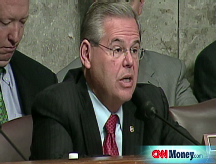Uncle Sam: Stockholder
One bailout provision would give government equity stakes in the firms it helps. Is it a good idea?
NEW YORK (CNNMoney.com) -- Should Uncle Sam get stock in the companies it helps?
After all, the government took big stakes in Fannie Mae, Freddie Mac and AIG when it took over those companies.
The issue is one of the more controversial questions being debated in Washington as lawmakers and the Bush administration hash out the proposed rescue of the financial system.
Treasury Secretary Henry Paulson is asking Congress for the OK to spend up to $700 billion to buy troubled assets that are weighing down the books of many companies - and Paulson says threatening the economy.
If the plan works, taxpayers in turn will get a more stable economy. The goal is to unfreeze the credit markets, which is what businesses rely on to fund their daily operations and payrolls. The fear is that if everyone stops lending, then a lot of people are going to be lose jobs or just stop spending.
"We're doing this to protect the system, and it's about keeping credit flowing, protecting savings, making it possible to have car loans, student loans, mortgages," Treasury Secretary Henry Paulson said Tuesday at a Senate Banking Committee hearing.
But lawmakers - and many of their constituents - are concerned that taxpayers would be taking all the risk and not sharing in the potential rewards that financial institutions might receive as a result of the bailout - namely, increased profits and a higher share price down the line.
So many in Congress want to add a provision to the bailout legislation that would give the government warrants for stock in the companies that it buys toxic assets from.
"Right now the price of admission [to the proposed Treasury program] is zero. It's not inappropriate to demand that if they benefit from this transaction in the future ... that they will share that benefit with the taxpayers who made the benefits possible," said Sen. Jack Reed, D-R.I., on Tuesday.
Both Paulson and Federal Reserve Chairman Ben Bernanke contend that the Treasury's plan is aimed not at helping individual companies because they pose systemic risk, but to reinvigorate and assure the credit markets and investors that financial institutions are clearing away hard-to-value assets from their books.
"If we're dealing with going concerns, companies that are still operating and have reasonable business prospects, we don't want to threaten the companies with reducing their share value," Bernanke said.
Participation in the Treasury's plan to buy troubled assets would be voluntary. Paulson is worried that requiring companies to give up stock would narrow the pool of participants - which in turn would make it harder to establish a competitive market for pricing on the currently illiquid assets.
"The model you're looking at is the model where you go to people that absolutely need to sell and say, 'if you want to sell, give us something,' " Paulson said.
There are not enough details about the equity-stake proposal to gauge how much of a deterrent, if any, such a condition would pose. Under one of the leading Democratic proposals, warrants would not be mandatory in all circumstances.
Nor is it clear how many or what kind of shares the government would get. Reed, for instance, has proposed the government get non-voting shares "in proportion" to the amount of assets the government buys from a company.
It's likely that any equity stake wouldn't be as low as 1% of a company, but not anywhere near as high as 79.9% AIG agreed to give up in exchange for the $85 billion bridge loan from the Federal Reserve.
Either way, Brad Sorensen, director of sector research for Charles Schwab, said he has "few doubts" companies would be deterred from participating in the program.
For one thing, companies may have to recognize the stock warrants they turn over to the government as outstanding liabilities. Potential investors may then view that as dilutive of the share price and think twice about putting capital into the companies.
"If you leave the risk on the balance sheet in that way, you really haven't accomplished anything," Bernanke said.
But Brian Bethune, chief U.S. financial economist at Global Insight, believes that giving taxpayers a potential stake in companies would not deter companies as long as the warrants were not mandatory.
Rather, he said, it could be an option for the government to take if it saw the need, perhaps as a sweetener in deals where the Treasury wasn't getting the price it wanted on an asset.
"You have to give the government negotiators as much latitude as possible to make deals," Bethune said.
In the meantime, negotiations over the final shape of the bailout are fluid. On Monday, House Financial Services Chairman Barney Frank, D-Mass., said the Treasury had agreed to an equity stake provision. On Tuesday, he said, "I overstated that agreement. We're not quite there yet."
- CNN Congressional producer Deirdre Walsh contributed to this report. ![]()



